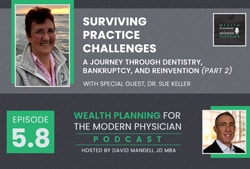A Journey Through Dentistry, Bankruptcy, and Reinvention
Listen in or watch, as host David Mandell continues his conversation with dentist and coach Dr. Sue Keller. Picking up where they left off at the end of Part I, David and Sue discuss the ongoing financial challenges of her specialty dental practice. Here, they tackle Sue’s difficult decision to file bankruptcy for the practice after more than 20 years—and the legal, practical and emotional processes involved.

(Video Available December 25, 2024 at 6 AM Eastern)
The discussion then turns to Sue’s transition after closing her practice – from working part-time for another dentist, serving patients as part of a non-profit and her eventual interest in, and transition to, coaching.
David and Sue conclude the conversation chatting about Sue’s role as a coach and how physicians and dentists could benefit from this type of advisor.
TAKEAWAYS:
Takeaway 1: Dentistry Bankruptcy Does Not Necessarily Mean Failure, but it Can be A Step Toward A More Balanced Life
Dr. Sue discusses her journey from running a private dental practice to facing the prospect of bankruptcy and ultimately rediscovering her passions and balance in life. She stresses that bankruptcy is not synonymous with failure or death but a viable option for a fresh start when a business is no longer viable or fulfilling.
Sue states, “You need to realize, well, I had to separate me from the practice and I had to acknowledge that I was losing $7,000 per month. I had to also acknowledge that I had done the best I could and there was a lot of trying circumstances, but I was not helping anybody and I was destroying myself trying to put everything into this practice.” She further emphasize that it was critical to understand the financial aspects of the business and the importance of experts and advisors in making informed decisions.
Takeaway 2: Regular Evaluation of Business and Life Balance is Vital
Dr. Sue’s experience highlights the importance of regular introspection and assessment of both business performance and personal life balance. She points out the dangers of becoming too emotionally attached to a business, especially when it starts deterring from personal well-being and family life. Moreover, she emphasized the need to keep track of the business’s financial health.
She suggests, “You need to really know what your numbers are, follow the numbers. When they’re trending the wrong way, get different opinions.” She also stresses the importance of maintaining a balance between work and personal life, saying, “Why are you giving up your life? You’re spending all your time on work and not enough time on other things.”
The Importance of Community and Support in Times of Crisis
Another critical point that Dr. Sue makes is the importance of community and having a support system during challenging times. She suggests that sharing vulnerabilities and experiences with peers can help individuals realize they are not alone in their struggles and can lead to new insights and solutions.
She states, “You are never alone. Somebody else has gone through this, something like this. You are not alone.” Furthermore, she emphasizes the benefits of joining groups or communities where individuals can safely discuss their problems and seek advice. She concludes, “Safe places where you can talk about what’s actually happening.”
INSIGHTS
- David discusses the stigma around bankruptcy in the medical and dental fields and how it can be a difficult but necessary decision.
- Dr. Sue opens up about the emotional attachment she had to her practice, likening it to one of her children, which made it hard to let go despite financial struggles.
- By 2018, Sue realized she was losing $7,000 per month despite working with coaches, accountants, and business consultants.
- She shares that her staff turnover and the irregular income of her practice contributed to her financial distress, comparing the ups and downs to a “gambling addiction.”
- A business coach encouraged Dr. Sue to explore bankruptcy, which led her to interview multiple lawyers to understand her options.
- Sue highlights the emotional weight of separating her identity from the practice, realizing she wouldn’t “die” if the practice failed.
- Once she accepted the need for bankruptcy, Dr. Sue moved quickly, closing the practice within a month and transitioning into part-time work at another practice.
- Working part-time at another dental practice, Sue found she earned more with less stress and more time for herself than she ever did in her own practice.
- The bankruptcy process took several years to resolve, but Dr. Sue managed to repay part of her debt and eventually moved on from the practice.
- During the COVID-19 pandemic, Sue worked with the Medical Reserve Corps, vaccinating as part of a team, which she found rewarding and different from the solo nature of running a practice.
- Dr. Sue transitioned into life coaching after discovering her love for helping people make positive life changes, drawing on her own experiences of resilience.
- She explains the distinction between coaching and therapy, emphasizing that coaching focuses on helping clients take steps toward future goals, rather than revisiting past traumas.
- Sue advocates for the importance of balance in life, urging professionals to reflect on whether their careers are enhancing or detracting from their overall well-being.
- She notes the value of mastermind groups and communities where professionals can openly share challenges and vulnerabilities without competition.
- The episode ends with Dr. Sue encouraging listeners to seek support, whether through coaching, therapy, or peer groups, as no one is truly alone in their struggles.
LINKS:
- Guest, Dr. Sue Keller’s Bio | Connect on LinkedIn
- Host, David B. Mandell’s Bio

